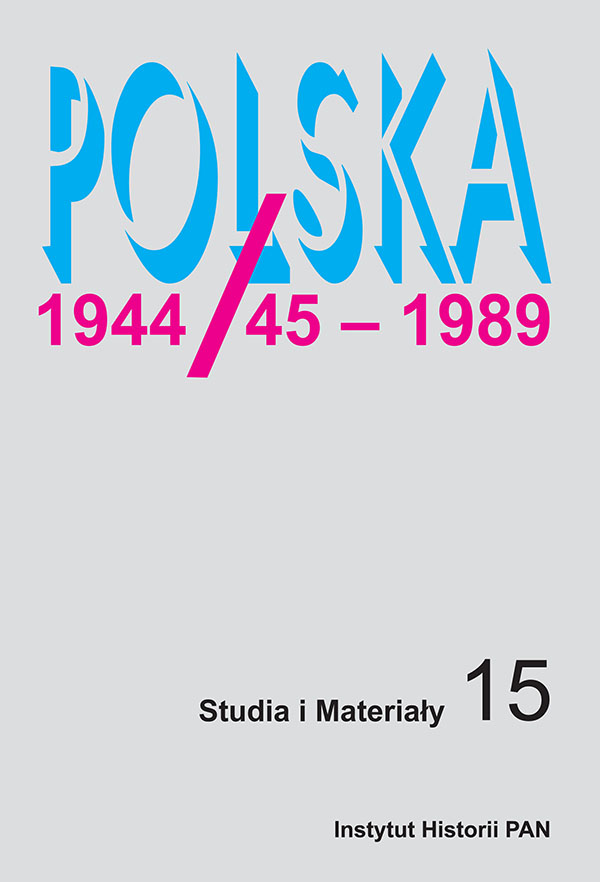Krótki kurs historii „kobiet”. Kobiety w języku partii komunistycznej w Polsce 1945–1989
DOI:
https://doi.org/10.12775/Polska.2017.12Słowa kluczowe
płeć, kobiety, komunizm, partia komunistyczna, Polska 1944–1989, gender, women, communism, communist party, Poland 1944–1989Abstrakt
Artykuł zwraca uwagę na dyskurs na temat kobiet formułowany przez partię komunistyczną w powojennej Polsce. Podstawą wyodrębnienia i rozumienia bardzo istotnej dla PPR/PZPR kategorii „kobiety” były zarówno przesłanki ideologiczne, jak i tradycyjnie rozumiane różnice płci. Kobiecość nie została odrzucona, lecz przedefiniowana. Dyskurs o kobietach zasadzał się na tezie, że równouprawnienie i równość nie są sprzeczne z tradycyjnie rozumianą kobiecością. Partia starała się go wykorzystywać do mobilizacji kobiet do „budowy socjalizmu”.
Short course on the history of “women”. Women in the vocabulary of the communist party in Poland 1945–1989
The purpose of the article is to analyse the discourse formulated by the communist party in postwar Poland (1944–1989) on the category of “woman”. The author attempts to answer the question about what was understood by this category, what traits were attributed to women, in what way their social roles were perceived and what roles were postulated for them. Women in the understanding of the party and its activists made a separate group with its own identity. The way in which this category of “women” was constructed was based on the party’s ideology, but also on quite traditional concepts of gender, which resulted in certain contradictions: on the one hand the fight against stereotypes of women and their roles was proclaimed, while on the other some of them were shaped and strengthened. This was to serve political purposes: to mobilise women to “build socialism” in areas seen as “feminine” (for instance health and social care, household management, etc.). Conclusions drawn from the analysis lead us to a different thesis than the one formulated by Eva Fodor for Hungary; she claims that the “female subject/communist personality” was subordinate to that of male. In Poland the discourse of the communist party sought to incorporate values and roles it saw as female into the construction of a socialist society, without suggesting the inferiority of women.
Bibliografia
Fidelis M., Przodownice i buntowniczki. Strajki kobiet w Żyrardowie 1945–1951, w: Płeć buntu. Kobiety w oporze społecznym i opozycji w Polsce na tle porównawczym, red. N. Jarska, J. Olaszek, Warszawa 2014
Fidelis M., Women, Communism, and Industrialization in Postwar Poland, Cambridge 2010
Fodor E., Smiling Women and Fighting Men. The Gender of the Communist Subject in State Socialist Hungary, „Gender and Society” 16, 2002, nr 2
Jarska N., Frauen in den kommunistischen Parteien PPR/PZPR – die Paradoxe der Frauenpolitik 1945–1960, „Jahrbuch für Historische Kommunismusforschung” 2015
Jarska N., Kobiety z marmuru. Robotnice w Polsce w latach 1945–1960, Warszawa 2015
Jarska N., Obchody Dnia Kobiet w Polsce Ludowej, „Dzieje Najnowsze” 2010, nr 4
Kenney P., Pojęcie Matki Polki w języku opozycji i władzy, w: Komunizm. Ideologia, system, ludzie, red. T. Szarota, Warszawa 2001
Kenney P., The Gender of Resistance In Communist Poland, „American Historical Review” 1999, nr 4
Miernik G., Opór kobiet przeciw kolektywizacji – najważniejsze konteksty, w: Płeć buntu. Kobiety w oporze społecznym i opozycji w Polsce na tle porównawczym, red. N. Jarska, J. Olaszek, Warszawa 2014
Petö A., As he saw her. Gender politics in secret party reports in Hungary during the 1950s, w: A. Petö, M. Pittaway, Women in History – Women’s History. Central and Eastern European Perspectives, Budapeszt 1994
Scott J.W., Gender. A Useful Category of Historical Analysis, „The American Historical Review” 91, 1986
Stańczak-Wiślicz K., Od neomatriarchatu do szpitala-pomnika Matki Polki. Ideologie macierzyństwa w dyskursach władzy i opozycji w Polsce (1945–1989), w: Niebezpieczne związki. Macierzyństwo, ojcostwo i polityka, red. R. Hryciuk, E. Korolczuk, Warszawa 2015
Verdery K., What Was Socialism and What Comes Next?, Princeton, New Jersey 1998
Wood E., The baba and the comrade. Gender and Politics in Revolutionary Russia, Bloomington 1997
Pobrania
Opublikowane
Jak cytować
Numer
Dział
Statystyki
Liczba wyświetleń i pobrań: 459
Liczba cytowań: 0



